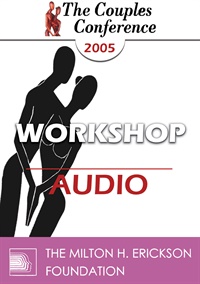CC05 Workshop 09 - Changing Belief Systems - Peggy Papp, ACSW
- Average Rating:
- Not yet rated
- Topic Areas:
- Workshops | Belief Systems | Relationships | Cultural and Social Contexts
- Categories:
- Couples Conference | Couples Conference 2005 | Pioneers in Couples and Family Therapy
- Faculty:
- Peggy Papp, ACSW
- Duration:
- 2:00:56
- Format:
- Audio Only
- Original Program Date:
- Mar 05, 2005
- License:
- Never Expires.
Description
Description: This session focuses on shifting belief systems in couples therapy, highlighting how cultural and personal histories shape relationship dynamics. A case study of a cross-cultural couple illustrates how therapy addressed communication barriers, cultural expectations, and emotional expression. Techniques included genograms, poetry, and symbolic tools like masks to improve understanding and connection. Emphasis is placed on empathy, creativity, and helping partners support each other’s growth and change.
Syllabus Description: Therapists sometimes get stuck trying to change a couple's interactional patterns without understanding the underlying belief systems that maintain the patterns. By zeroing in on the core beliefs and expectations of each partner, the therapist is able to address multiple levels of experience and help the couple change pivotal aspects of their relationship in a short period of time. Conflicting beliefs around money, sex, power, gender, responsibility and intimacy will be examined within this therapeutic framework. Videotapes excerpts will demonstrate different ways of changing constraining beliefs to those that enrich the relationship.
Educational Objectives:
- To describe two methods for uncovering the beliefs and expectations underlying destructive interactional patterns.
- To describe two different ways of changing constraining beliefs to those that enhance the relationship.
*Sessions may be edited for content and to preserve confidentiality*
Credits
Handouts
| Timestamped Transcript (889.1 KB) | 21 Pages | Available after Purchase |
| Timestamped Transcript (797.4 KB) | 18 Pages | Available after Purchase |
| Ericksonian Learning Snapshot (248.9 KB) | 2 Pages | Available after Purchase |
Faculty

Peggy Papp, ACSW Related Seminars and Products
PEGGY PAPP, A.C.S.W., is a therapist in private practice and Co-Director of the Brief Therapy Project at the Ackerman Institute for Family Therapy in New York City. She is recipient of the lifetime achievement award from the American Family Therapy Association and the award for distinguished contribution to Marital Family Therapy from the American Association for Marital and Family Therapy. Her latest book is Couples On the Fault Line.


